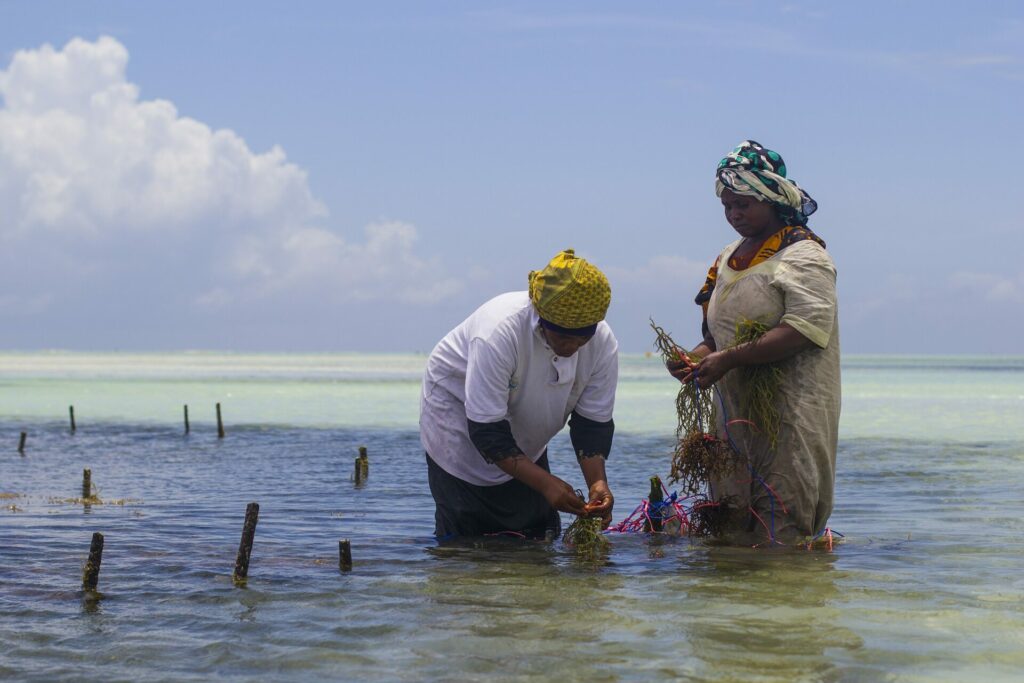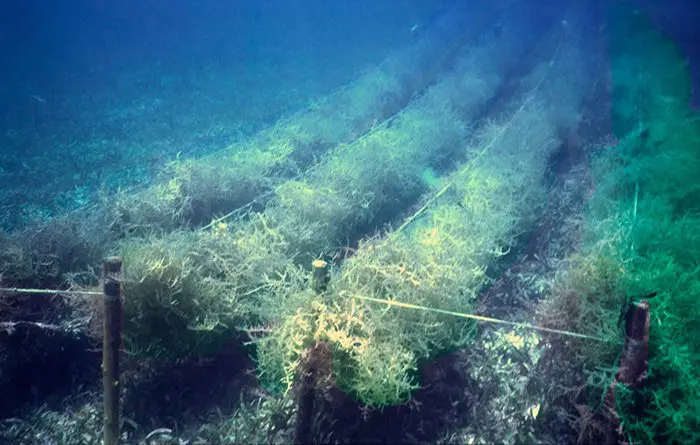Eucheuma farming, Philippines
Bruges/Oban, 10 November 2021 – An international expert team of 37 seaweed scientists from across the globe has warned that the multi-billion-dollar seaweed farming industry – which has overseen rapid growth in recent years – must balance economic profitability with environment, human and organism health to ensure its long-term survival.
Researchers on the international GlobalSeaweedSTAR programme funded by UK Research and Innovation and the United Nations University Institute on Comparative Regional Integration Studies (UNU-CRIS) have today (10 November) published an international policy brief, issuing a series of recommendations to improve the resilience and sustainability of the industry.
Seaweed cultivation is the most rapidly expanding sector in aquaculture production, accounting for more than 50 per cent of total global marine production, equating to around 34.7 million tonnes. Rapid growth in the past 50 years, meant the industry reached a value of USD 14.7 billion in 2019. The industry supports the livelihoods of over 6 million small-scale farmers and processors, many of whom are women, in predominantly low and middle-income countries.
Seaweed cultivation is now receiving increased interest from higher income counties as a nature-based solution to economic development, contributing greatly to the UN Sustainable Development Goals (SDGs) and the UN Decade of Ocean Science for Sustainable Development (2021 – 2030).
Seaweed is already widely used in food, cosmetic, pharmaceutical and agriculture industries and has potential as a biofuel. Seaweed farming increases and restores biodiversity by providing habitats for marine creatures and can help to mitigate climate change through carbon capture and methane emission reduction.
There is also a growing commercial demand for higher value seaweed-derived products, such as hydrocolloids and for food ingredients, medical treatments and as a specialist agar, used as a laboratory medium for COVID-19 testing.
The rapid expansion of the industry though has been in tandem with increasing pressures from warming seas caused by climate change and an over-reliance on certain species, which has seen the industry ravaged by pests and diseases.
The policy brief’s lead author and GlobalSeaweedSTAR programme leader Prof Elizabeth Cottier-Cook said: “Coastal communities in low to middle income countries have come to rely on seaweed farming for their livelihoods, but we are already seeing the detrimental impacts of climate change and a lack of biosecurity protocols on this industry.”
“Warming seas have made coastal waters uninhabitable for some species, while an over-reliance on a few species of seaweed and the widespread importing of non-native stock has allowed pests and disease to spread through entire farms.”
“Our policy brief recognises the importance and the potential of this industry in helping to alleviate poverty in developing nations and in meeting the UN Sustainable Development Goals.”

“However, improvements in biosecurity, pathogen identification and reporting systems, the establishment of seed-banks and nurseries to reduce the dependence on imports and the conservation of genetic diversity in wild stocks are urgently required if the industry is to prosper.”
“These challenges must be addressed in combination with the establishment of incentives, policies and capacity building initiatives, which protect livelihoods, are gender-responsive and increase the resilience, particularly of the small-scale farmers and processors and the wider environment, to the impacts of climate change and the globalisation of this industry.”
Co-author of the policy brief, UNU-CRIS Senior Research Fellow and Coordinator of its Climate and Natural Resources Cluster Dr. Nidhi Nagabhatla said: “As world leaders gather at Climate COP26 to discuss climate solutions, emerging evidence of seaweeds aquaculture role in mitigation and adaptation to climate impacts offers potential for building coastal resilience for communities and ecosystems.”
“Integrated solutions with multiple benefits remain core towards building a new ocean economy and to conserve the global coastal and marine ecosystems while contributing to tackling food (and nutritional) insecurity and climate change, this policy message decode this argument pointing to the Seaweed industry.”
Director of UNU-CRIS and co-author of the policy brief Philippe De Lombaerde said: “The global policy brief brings together 37 experts from 30 institutions and 18 countries to collective outline a message for creating sustainable value chains, inclusive production systems and gender balanced policies for the rapidly expanding seaweed.”
The policy brief has outlined eight recommendations, ranging from developing new international policies and regulations to establishing a series of regional seaweed research networks to ensure policy improvements are aligned across the industry.
Recommendations:
- Develop clear international policies and regulations, which can be adopted and owned by a specific body at national and regional levels, such as the production of a list of notifiable pathogens and the introduction of a clear reporting system for outbreaks.
- Develop regional and national capacity building initiatives, which are gender-responsive, including training programmes in biosecurity, farm management practices, early diagnostic procedures for exotic and emerging pathogens, to enable effective pathogen management.
- Develop regional and national seed stocks and biosecure nurseries, which can support the diversification of cultured varieties.
- Maintain the genetic diversity in wild stocks by conserving wild populations through encouraging no-take zones, preventing the introduction of non-indigenous species and encouraging the development of indigenous strains/ varieties for commercial cultivation.
- Advance assessment tools for balancing the associated environmental risks with potential benefits of seaweed production and to enable risk-based analysis of management options at multiple scales.
- Incentivise the integration of seaweed with other fed-aquaculture species and with other maritime activities, where possible, to reduce the eutrophication, enable economic diversification and to minimise potential conflicts over resource use in the marine environment.
- Channel support for long-term investment in promoting the beneficial aspects of the industry, potentially through innovative finance schemes, that incentivise producers to adopt and implement biosecurity practices, carbon capture initiatives, biodiversity enhancement, support for diversification, fair access and distribution of seaweed products and innovative new cultivation techniques, to safeguard the industry against disease outbreaks, natural disasters and help build resilience to the impacts of climate change.
- Establish a network of Regional Seaweed Research Networks, to develop and ensure implementation of industry-wide standards for seaweeds, which can apply to both large- and small-scale producers, that include: improvements in yield, integrated pathogen management control, early warning systems for pathogen outbreaks, breeding, use of pathogen resistant stocks, genetic resource conservation and incorporates the human and wider environmental concerns. These networks would also contribute to policy improvements, to ensure alignment of policies with the One Health Aquaculture Approach and to aid countries in the implementation of national initiatives, such as the introduction of their Progressive Management Pathways for improving Aquaculture Biosecurity, specifically related to Seaweed.
###
About GlobalSeaweedSTAR
GlobalSeaweedSTAR is a four year, challenge-led programme (1 Oct 2017 to 31 Dec 2021) funded by the Global Challenge Research Fund of UK Research and Innovation (UKRI) . The programme brings together an international team of experts in science, policy and economics from nine partner institutions across the United Kingdom, the Philippines, Malaysia, Tanzania and Belgium, working together to safeguard the future of the global seaweed industry.
www.globalseaweed.org
About United Nations University Institute on Comparative Regional Integration Studies (UNU-CRIS)
The United Nations University Institute on Comparative Regional Integration Studies (UNU-CRIS) is a research and training institute of the United Nations University based in Bruges, Belgium. UNU is a global network of institutes and programmes engaged in research and capacity development to support the universal goals of the UN. It brings together leading scholars from around the world with a view to generate strong and innovative knowledge on how to tackle pressing global problems.
UNU-CRIS focuses on the study of processes of global cooperation and regional integration and their implications. It acts as a resource for the UN system, with particular links to the UN bodies dealing with regional integration, and works in partnership with institutes and initiatives throughout the world that are concerned with issues of integration and the provision of public goods.
About Scottish Association for Marine Science (SAMS)
The Scottish Association for Marine Science (SAMS) is Scotland’s largest and oldest independent marine science organisation, delivering marine science for a productive and sustainably managed marine environment through innovative research, education and engagement with society.
Based near Oban on the Scottish west coast, our marine research and teaching portfolio is diverse in topic and discipline, global in outlook, project locations and relevance, and delivered by a SAMS team with can-do attitude working in partnership with academic, business, government, regulatory, voluntary and civic society colleagues.
SAMS is a charitable organisation (009206) with a membership that elects the Board members following a recruitment process. It is also a Company Limited by Guarantee registered in Scotland (SC 009292) and operates two wholly owned subsidiary companies: SAMS Enterprise – a specialist marine consultancy – and SAMS Ltd. It is an academic partner of the University of the Highlands and Islands.
Photo: – Eucheuma farming, Philippines ©CC BY 2.0







